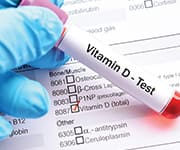LIFE EXTENSION MAGAZINE
Vitamin D Supplementation May Help Critically Ill Patients
Findings from a meta-analysis review in Critical Care suggest that providing critically ill patients with vitamin D supplements may improve some outcomes, including survival.*
Researchers identified 16 trials that evaluated the association between vitamin D supplementation and mortality among critically ill individuals. Twelve studies reported intensive care unit (ICU) length of stay, nine reported 28-day mortality, and nine reported length of mechanical ventilation.
Study participants received vitamin D either by mouth, feeding tube, intramuscular injection or intravenously.
Vitamin D supplementation was associated with a 22% lower risk of overall mortality compared to a placebo or standard care.
Among studies that reported 28-day mortality, vitamin D supplementation was associated with a trend toward a lower risk.
Patients who received vitamin D spent an average of 3.13 days less in the ICU and five fewer days on a ventilator than those who received a placebo.
Editor’s Note: In patients admitted to the ICU, significantly reduced serum vitamin D levels “…are frequent and independently associated with higher incidence and severity of sepsis,” the authors stated.
* Crit Care. 2022 Sep 6;26(1):268.
Less Fatigue with CoQ10
The results of a meta-analysis of clinical trials published in Frontiers in Pharmacology confirm an anti-fatigue effect in individuals who supplemented with coenzyme Q10 (CoQ10).*
Researchers identified 13 randomized, controlled trials that compared fatigue scores among a total of 1,126 participants who received CoQ10 or a placebo.
Analysis of the 13 trials showed a consistent, significant effect of CoQ10 in reducing fatigue.
When trials that included healthy participants were analyzed separately from trials that included patients with fatigue-associated diseases, both supplemented populations showed decreases in fatigue, however the effects were more significant among the unhealthy participants, who had more severe CoQ10 depletion.
Higher CoQ10 doses and longer duration of supplementation were correlated with greater reduction in fatigue.
Editor’s Note: While the body makes some CoQ10, the authors remarked that studies have provided evidence that supplementing with CoQ10 does not affect the body’s synthesis of the coenzyme.
* Front Pharmacol. 2022 Aug 24;13:883251.
Adequate Nutrient Intake Can Help You Live Longer
A study that utilized data from the National Health and Nutrition Examination Survey (NHANES) 1999-2010, found an association between adequate intake of specific nutrients and a lower risk of dying during a median follow-up of 9.3 years, the Journal of Nutrition reported.*
Nutrient adequacy was calculated as the percentage of the RDA met by the participants according to age and gender.
Compared to participants whose magnesium intake was among the lowest one-third, those whose intake was among the top third had a22% lower adjusted risk of all-cause mortality, a35% lower risk of dying from cardiovascular disease and a 29% lower risk of cancer death during follow-up.
Top consumers of vitamin E, potassium, and fiber had a 19%, 18% and 16%, respectively, lower risk of premature mortality.
Editor’s Note: “Americans are underconsuming essential nutrients while overconsuming several nutrients, including sodium, saturated fat, and added sugars,” the authors asserted.
* J Nutr. 2021 Oct 1;151(10):3214-3222.
Protein Supplementation Benefits Lean Body Mass
A “systematic review of systematic reviews” published in Sports Medicine showed that the addition of protein supplementation to resistance training is associated with a greater increase in lean body mass (body mass minus fat mass) in comparison with resistance training alone.*
Researchers selected five systematic reviews with meta-analyses of randomized trials that compared the effects of resistance training alone to resistance training combined with protein and/or amino acid supplementation. The 46 studies included in the meta-analyses involved a total of 2,925 men and women over 50 years of age.
Supplemented groups received 12-40 grams of protein or 3-10 grams of amino acids while the control groups received a placebo or no supplementation.
Among the four meta-analyses that evaluated lean body mass, three found a significant increase in association with resistance training plus protein supplementation compared to resistance training without supplementation.
Editor’s Note: There was also a significant benefit for protein supplementation combined with training on muscle mass alone.
* Sports Med. 2022 Oct;52(10):2511-2522.





